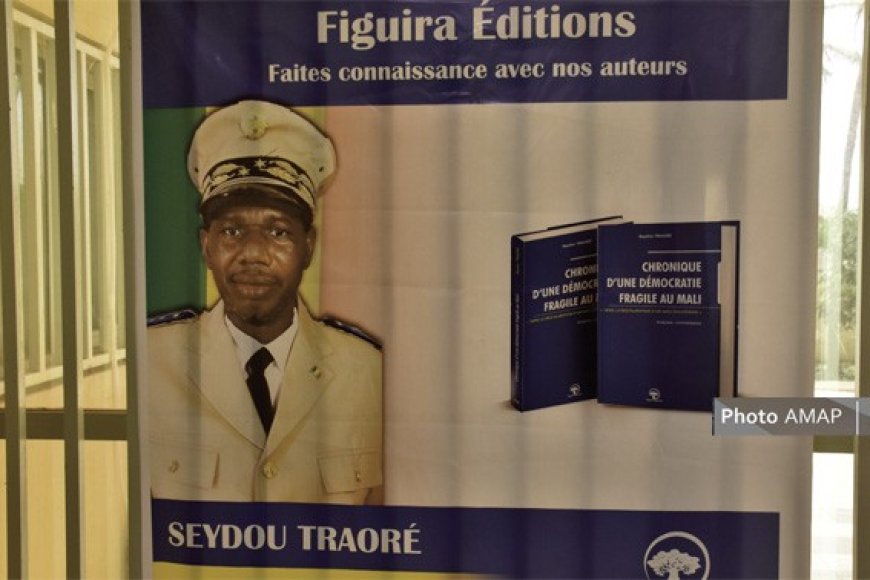«Chronique d’une démocratie fragile au Mali : vers la restauration d’un Mali souverain». La cérémonie s’est tenue, samedi dernier au gouvernorat du District de Bamako, sous la présidence du directeur général de l’Administration territoriale, Moussa Pamata, représentant le ministère de tutelle, le Général de division Abdoulaye Maïga. Les représentants du ministre de la Communication, de l’Économie numérique et de la Modernisation de l’administration, Mohamed Ag Albachar, et du département de la Culture, de l’Artisanat, de l’Industrie hôtelière et du Tourisme, Amadou Bekaye Sidibé, ainsi que plusieurs responsables du monde littéraire étaient présents.
Édité en août dernier par la Maison d’édition Figuira, l’ouvrage de 120 pages dresse un diagnostic approfondi du système démocratique malien. Administrateur chevronné, l’auteur revient minutieusement sur l’exercice et la pratique démocratique depuis 1991. Son livre, qualifié de véritable travail de mémoire, retrace les crises successives qui ont fragilisé le pays et mené aux événements du 22 mars 2012.
Il pointe du doigt les dérives observées qui, selon lui, relèvent d’une politique de manipulation, de guerres de positionnement et de luttes pour des intérêts privés au détriment de l’intérêt général. J’ai réalisé que des acteurs politiques ont profité du mouvement de l’AEEM pour des règlements de comptes politiques», révèle-t-il, expliquant son engagement à écrire pour défendre la patrie en danger depuis les événements de mars 1991.
Dans son analyse, Seydou Traoré explique également les causes des échecs des différents régimes du pays. Son ouvrage constitue, dit-il, un devoir de mémoire sur les événements qui ont marqué le Mali et influencé sa carrière de représentant de l’État.
Au-delà du constat, le livre propose aussi des pistes concrètes pour la restauration de l’État et le redressement de la démocratie. Organisé en deux grandes parties (Chronique d’une fragile démocratie au Mali et la restauration de l’état, objectifs et outils de faisabilité), il se veut aussi une contribution à la formation de la jeunesse et à la construction d’un Mali pleinement souverain. L’auteur, qui assume pleinement le contenu de son ouvrage, plaide pour le renforcement de la représentation de l’État sur l’ensemble du territoire condition sine qua non pour le retour de la paix. «La crise qui a commencé au Nord, précisément dans la Région de Kidal, va prendre fin à Sikasso, inchallah», a-t-il affirmé.
La chargée éditoriale de Figuira, Oumou Kadidia Théra, s’est réjouie de voir cet ouvrage rejoindre leur catalogue. L’ouvrage selon elle, paraît désormais comme un vestige essentiel de l’histoire de notre pays retraçant des événements historiques des années 1960 à nos jours. En outre, elle a salué la collaboration avec l’auteur, qui «a œuvré au maximum de ses capacités pour offrir un produit répondant aux exigences académiques et intellectuelles du pays».
Pour le directeur général de l’Administration territoriale, le livre est une contribution majeure qui servira désormais de boussole aux représentants de l’État. Selon lui, l’ouvrage arrive à un moment clé de l’histoire politique et institutionnelle du Mali, marqué par d’importantes réformes. «Les défis auxquels notre démocratie est confrontée sont révélés là-dedans, et des solutions y figurent. Cela est très important et salutaire», a-t-il insisté.
Il a rappelé que la démocratie est un processus permanent, «la démocratie n’est jamais acquise. C’est tout un chemin. Il faut construire, reconstruire, œuvrer sans relâche pour atteindre un idéal de perfection souvent difficile».
Quant à Mohamed Ag Albachar a, il salué un ouvrage qui dépasse le simple récit. «C’est un éclairage, une interrogation, parfois un miroir tendu à nous-mêmes. En analysant nos forces et nos fragilités, l’auteur nous invite à un exercice de lucidité et de responsabilité citoyenne». Avant de souligner aussi que c’est un fait rare qu’un cadre de l’administration prenne ainsi la parole étant en fonction.
Le représentant du ministre en charge de la Culture a félicité l’auteur. Amadou Bekaye Sidibé a rappelé que les acteurs contemporains ont la responsabilité d’écrire pour éclairer les générations futures et ce livre aide, selon lui, comprendre l’actualité, propose des pistes concrètes et incite à se lever pour défendre la nation.
Conseiller aux affaires administratives et juridiques de Kidal, Seydou Traoré est bien connu dans le milieu de l’administration territoriale pour son engagement patriotique et ses efforts constants dans la lutte pour la paix et le vivre-ensemble. Il est titulaire d’une maîtrise en Droit des affaires. Représentant de l’État depuis 2011, il a travaillé successivement au contentieux de l’Office de la haute vallée du Niger (OHVN) et à la Direction nationale de l’intérieur, avant d’être nommé sous-préfet à Tambacara, Cercle de Yélimané.
Il a ensuite servi comme 2è adjoint au préfet de Tominian en 2017, puis 1er adjoint au préfet de Kidal en 2022. En 2023, après la reprise de la ville par les Forces armées maliennes, le 14 novembre 2023, il y a posé ses valises en qualité de conseiller aux affaires administratives et juridiques du gouverneur.
La cérémonie s’est achevée par une séance de dédicace. L’ouvrage est disponible dans les librairies au prix de 10.000 Fcfa.
Tamba CAMARA
Crédito: Link de origem



Comments are closed.